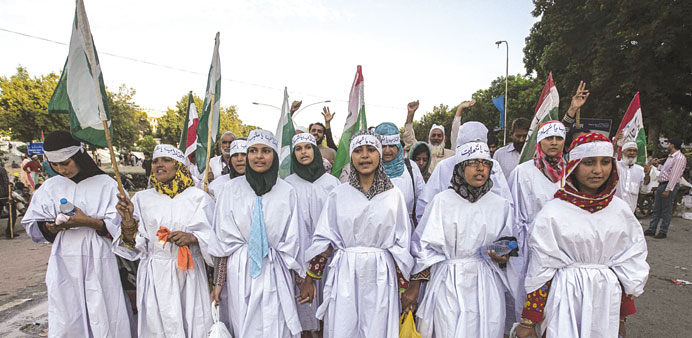Pakistan Awami Tehreek supporters of Tahir ul-Qadri chant slogans in front of the Parliament during the Revolution March in Islamabad.
Authorities in Pakistan yesterday launched a murder probe naming the prime minister as a suspect in a bid to defuse a fortnight of anti-government protests, though the move was immediately rejected by a protest leader.
Thousands of demonstrators led by populist cleric Tahir ul-Qadri and politician Imran Khan have camped outside the parliament building in Islamabad to demand the resignation of Prime Minister Nawaz Sharif.
The two-week showdown at the heart of the capital has rattled the nuclear-armed state, and shaken Sharif’s government just 15 months in to a five-year mandate.
As well as wide-ranging calls for political reform, Qadri has also demanded police bring murder charges against Sharif over the killing of at least 10 of his followers in clashes with police in the eastern city of Lahore.
A statement from the prime minister’s office said yesterday orders had been given to register a case.
“Federal government has decided to authorise registration of model town First Information Report (FIR) as per complaint of the aggrieved,” the statement said.
A senior police official requesting anonymity said the report named 21 people, including Sharif and his brother Shahbaz Sharif, the chief minister of Punjab province, of which Lahore is the capital.
But Qadri rejected the move, complaining the police had not included the same terror charges which were levelled at the cleric and his supporters over the incident against members of the government.
“We do not accept it,” he said, before repeating his list of demands, including the prime minister’s resignation.
A week of on-off talks have made little obvious headway, and Qadri’s team had billed yesterday’s speech as “final and historic”.
“After this speech Dr Qadri will have no control over the protesters and they will be allowed to leave,” Qadri spokesman Shahid Mursaleen said in a statement.
But as Qadri interrupted his hours-long speech for a break of unspecified length, it was not clear whether he would eventually call off the protest, though a source close to his camp said he may be planning to return to the eastern city of Lahore.
Khan has remained defiant and refused to end his own parallel sit-in protest, saying he was seeking “independence or death” and would not rest until both Sharif brothers quit.
Khan has alleged massive cheating in the May 2013 poll, though international observers said the vote was largely free and fair.
The two protest movements are not formally allied, but they have gained strength from one another, and Khan’s position would be weakened if Qadri ended his vigil.
Sharif yesterday met powerful army chief General Raheel Sharif to discuss the standoff, the second such meeting in as many days.
The two men agreed to “take necessary measures for resumption of stalled process of negotiations for an expeditious resolution in the best national interest”, a statement from the PM’s office said.
In a country that has seen three military coups, the threat of army intervention casts a shadow over virtually every moment of political crisis.
The government has set up a judicial commission to investigate poll rigging claims and a parliamentary committee to examine electoral reform, but neither move satisfied the protest leaders.
The protests have so far been peaceful, with security forces - deployed in huge numbers in the capital - taking a hands-off approach to the demonstrations.
Neither protest movement has mobilised mass support beyond their core followers, and other opposition parties have shunned Khan’s call to unseat the government and begin a campaign of civil disobedience.

